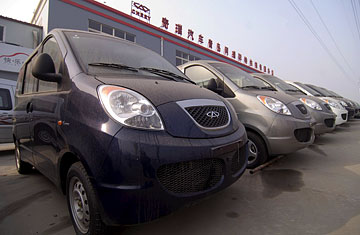
A line of cars at a Chery dealership in Qingdao, in eastern China's Shandong province, on Dec. 10, 2008
At a Buick dealership in downtown Beijing, sales manager Wang Quan has a lot less to do than he did a few months back. New Buicks used to leave his shop by the dozens each week, but these days, not even discounts of 15-18% can draw in the same number of paying of customers. "We used to sell 120 to 150 cars per month at this store," Wang says. "But starting from November, the number has shrunk to 90." The reason, he says, is simple: "The economic crisis."
The dramatic decline of China's car market is one of the best indicators of just how sharply and suddenly the global financial crisis has hit the world's fastest growing economy. In recent years, China's car market has been among the world's hottest, with growth rates routinely in double digits. But Chinese consumers, worried by depressed stocks, weakening property prices and growing job losses, are choosing to put new car purchases on hold. In November, cars sales plummeted 10% from a year earlier, according to state media. U.S.-based research firm J.D. Power predicts passenger vehicle sales will grow 8% this year, a big drop from the 24% growth in 2007. Next year will be even worse. J.D. Power forecasts sales will contract by 1% in 2009. (See the 50 worst cars of all time.)
A contracting car market in China deals another blow to a global industry already reeling from recessions in the U.S. and Europe. China was supposed to be a surviving bright spot, where international carmakers, beleaguered at home, could still find new sales and profits. But with the market shifted into reverse, the already fierce competition between foreign and Chinese automakers like Chery and Geely will only intensify. Discounting has become widespread as carmakers chase fewer customers with special deals, eating into profit margins. "When growth is slowing down, everyone will be trying to defend market share," says David Jin, managing director of Boston Consulting Group in Shanghai.
That's especially bad news for General Motors, currently begging for a bailout from the U.S. government. China has been a rare success story for GM in recent years, where its Buicks and Chevys have been consistent market leaders. A sharp downturn in China, auto analysts say, will add to GM's woes. While sales of Chevrolet-branded cars have remained robust, sales of Buicks fell 14% so far this year, according to GM. Still, GM remains committed to China, where earlier this month, Kevin Wale, president of GM China, said the company plans to introduce 10 new models by 2011.
But the many smaller Chinese makers might prove even more vulnerable to the downturn. These firms lack the technology, quality and brand recognition to easily compete with foreign players in a downturn. In a crowded market — with more than 40 Chinese brands — the slowdown may weed out the sector's weaker players. "There are too many manufacturers" in China, says John Bonnell, director of forecasting for Asia at J.D. Power in Bangkok. "We can expect a shakeout."
Analysts are hard-pressed to predict which might be the first to go. The automobile sector is a priority industry for the Chinese government, and many carmakers are already heavily backed by the state, which could aid to keep local champions afloat through the downturn. This week Chery, one of the country's most successful domestic automakers, received a $1.5 billion loan from China's Export Import Bank. Jin Yibo, Chery's spokesman, says that the loan isn't government aid or any sort of bailout, but a "business deal" between Chery and the bank. However the money is characterized, it will be a boost to Chery's operations. Jin says the funds will be used for export-related projects, such as developing new car models for overseas markets.
Chery will need all the help it can get. The global financial crisis is dampening the recent hopes of Chinese carmakers to become major international players. Chery's ambitions took a hit this week when a joint project with Chrysler to develop a small car for sale in the U.S. and elsewhere was terminated. In a statement, Mike Manley, Chrysler's executive vice president for international sales and marketing, said that the decision to cancel the cooperation agreement was made jointly by both companies because they "have realized that the economic situation and market environment around the world have changed significantly since the agreement was signed." Neither company explained in detail why the discussions on the joint project, which began in 2007, fell apart. But Lin Huaibin, an auto industry analyst at research firm Global Insight in Shanghai, believes both companies brought problems to the partnership. Chery, he says, wasn't ready to produce a car of strong enough quality for the global market, while a struggling Chrysler didn't possess the funds needed to invest in the venture. Chery's Jin says that the company's global ambitions remain intact. Chery "will of course continue our international expansion," Jin says.
And Jin has some people backing him up. Despite the recent downturn, analysts remain bullish on the prospects of the China market. Lin says the car market will begin to pick up again in the second half of 2009, bolstered by the giant government economic stimulus packages that have recently been laid out in Beijing. That money, he argues, will rebuild confidence among nervous consumers. "In the long term, the China market is still quite promising," Lin says. Though that is undoubtedly true, the road getting there will be a bumpy one.
— With reporting by Jessie Jiang / Beijing
